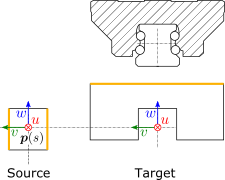Linear Guide¶
Linear guides are a special case of elastic joints. They implement a coupling between the source and target interface with linear elasticity and viscous damping properties.
Definition¶
Source and target interfaces should be chosen as shown in following figure:
Source interface¶
Type |
Moving interface (Fourier) |
Topologies |
Side faces of the rail (faces must spread in all directions) |
Location |
The path should go through the resulting location of action (approx. center of the rail) |
u direction |
Axial, along the rail in positive moving direction |
v direction |
Transversal, perpendicular to the rail, sidewards |
w direction |
Normal, away from the top surface of the rail |
Target interface¶
Type |
Stationary interface (6dof) |
Topologies |
Mounting face of the carriage |
Location |
Center of action |
u direction |
Axial, along the rail in positive moving direction |
v direction |
Transversal, perpendicular to the rail, sidewards |
w direction |
Normal, away from the top surface of the rail |
Recommended link settings¶
Use ground for source |
unchecked |
Location master |
target |
Orientation master |
either source or target |
Parameters¶
Stiffness¶
Parameter |
Unit |
Description |
|---|---|---|
Axial (u) |
N/m |
Axial stiffness (usually zero for a linear guide) |
Transversal (v) |
N/m |
Transversal stiffness |
Normal (w) |
N/m |
Normal stiffness |
Roll (ru) |
Nm/rad |
Roll stiffness |
Pitch (rv) |
Nm/rad |
Pitch stiffness |
Yaw (rw) |
Nm/rad |
Yaw stiffness |
Damping¶
Parameter |
Unit |
Description |
|---|---|---|
Axial (u) |
Ns/m |
Axial damping (viscous damping of the linear guide) |
Transversal (v) |
Ns/m |
Transversal damping |
Normal (w) |
Ns/m |
Normal damping |
Roll (ru) |
Nms/rad |
Roll damping |
Pitch (rv) |
Nms/rad |
Pitch damping |
Yaw (rw) |
Nms/rad |
Yaw damping |
